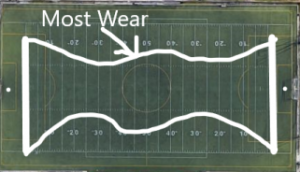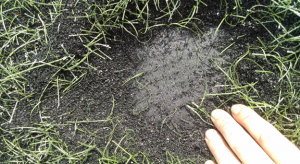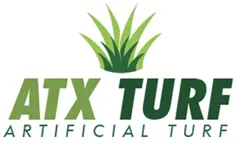How Long will Artificial Turf last?
Published July 27, 2022
Artificial Turf can last years or even decades depending on the amount of foot traffic in the
Multi-Purpose Athletic Fields
Some recreational, high school and college athletic fields are designed to accommodate multiple sports such as soccer, lacrosse and football. During the school year, daily use from dusk till dawn can accelerate the speed at which fields can wear.
On a football field, the highest wear occurs between the hash marks, up and down the field. Along the 50 yard line and goal lines, the higher wear will reach further out towards the sidelines. On older worn fields, aerial views from directly above will most often reveal an hourglass shape of the higher worn areas of football fields.
Soccer, Lacrosse and Field Hockey Fields almost always see extreme accelerated wear in front of the goals, where the goalies stand. The activity in these areas is so concentrated due to the goalies standing in the same spot for the majority of practices and games, it is not uncommon to see new patches of turf in these areas on older fields. 
Imagine a full size soccer field, 210 ft wide and 410 ft long, with a football field transposed on it 168 ft wide and 360 ft long, with lacrosse field lines and possibly field hockey lines traversing the inlaid football and soccer lines. This creates a field with multiple, high activity areas in different places, with many seems coming together at awkward angles. With heavy, year round, use throughout the day, these types of fields may need to be replaced sooner than single sport fields.
Synthetic Turf for Baseball
Conversely, Baseball Turf gets relatively light wear in comparison to football, soccer and other sports, due to baseball having fewer players on the field and relatively less foot traffic than the other sports. In some cases, when the pitching mounds and batters box areas are turfed, they can receive accelerated wear, similar to the goalie areas of soccer and lacrosse. In baseball, however, these areas are easier to patch, as they are originally a different color(most often clay) with existing seams defining the area.
Indoor and Outdoor Batting Cages
Batting Cage turf, in particular, can last significantly longer than turf in other use cases. Again, due to the lower foot traffic by nature of the sport. If batting mats and portable pitching mounds are used, these areas receive even less daily wear, extending the life of batting cage turf well beyond the warranty of the typical turf material.
Indoor Soccer Field Turf
Indoor Soccer fields receive high foot traffic concentrated in small areas and often need to be replaced more frequently. The obvious reason is that soccer simply has more running than baseball or other indoor training activities. Second, indoor soccer has anywhere between 5 v 5 or 10 v 10, in relatively small turf areas, and these leagues commonly have games late into the night. Since there are no standard regulations for private indoor soccer leagues, games can have many players simultaneously playing in areas the size of hockey rinks, which is 200 ft long by 85 ft wide. Older hockey rinks are often converted into indoor soccer areas for many financial reasons, which is why many indoor soccer areas measure the same. Condensing a game meant to be played outside on a 278 ft wide by 410 ft long field into a space half it’s size results in highly concentrated foot traffic, and in turn, accelerated wear on the indoor soccer pitch. Reach out to ATXTurf if you are considering converting a hockey rink into an indoor soccer field.
Decorative and Lawn Turf
Lawn turf can often last many, many years. This again, depends on the amount of traffic it receives and also your geographic location as it pertains to the weather. In the southwest for example, high sun and more UV rays can break down fibers than more climate areas. In the northeast, extreme cold and snow plows can do a number on turf areas. Often lawn and residential turf is simply meant to be decorative, or aesthetic to cover up unsightly areas, such as medians in the road or partitions of airport runway areas.
In summary, there are a number of variables to consider when determining how long your synthetic turf will last. Much like the tires on your car, it may have more to do with the number of miles they can go rather, than a specific time frame.
Contact a Rep at ATXTurf today to discuss the life expectancy of your Turf for your application. 866-428-2809

0 Comments